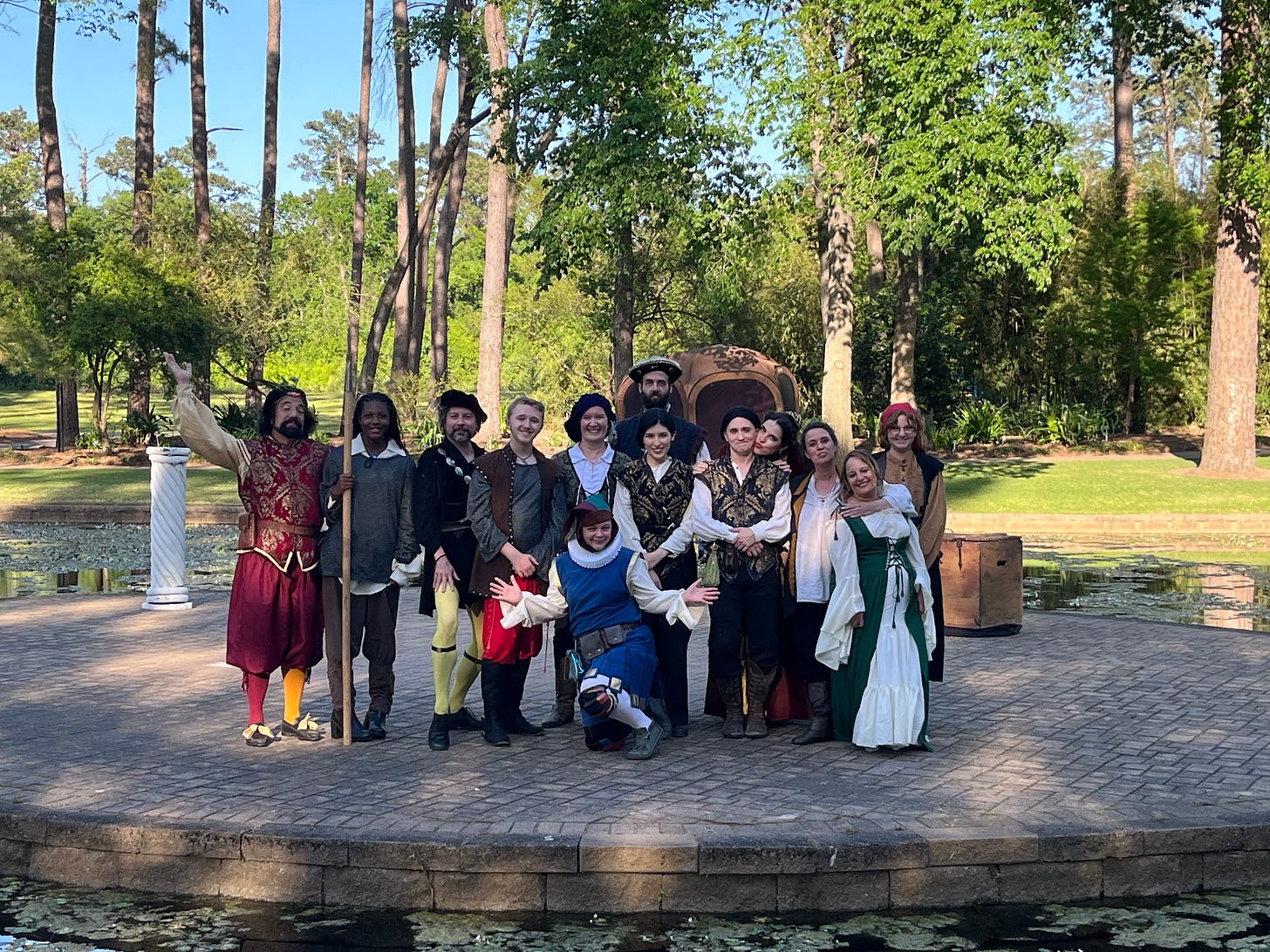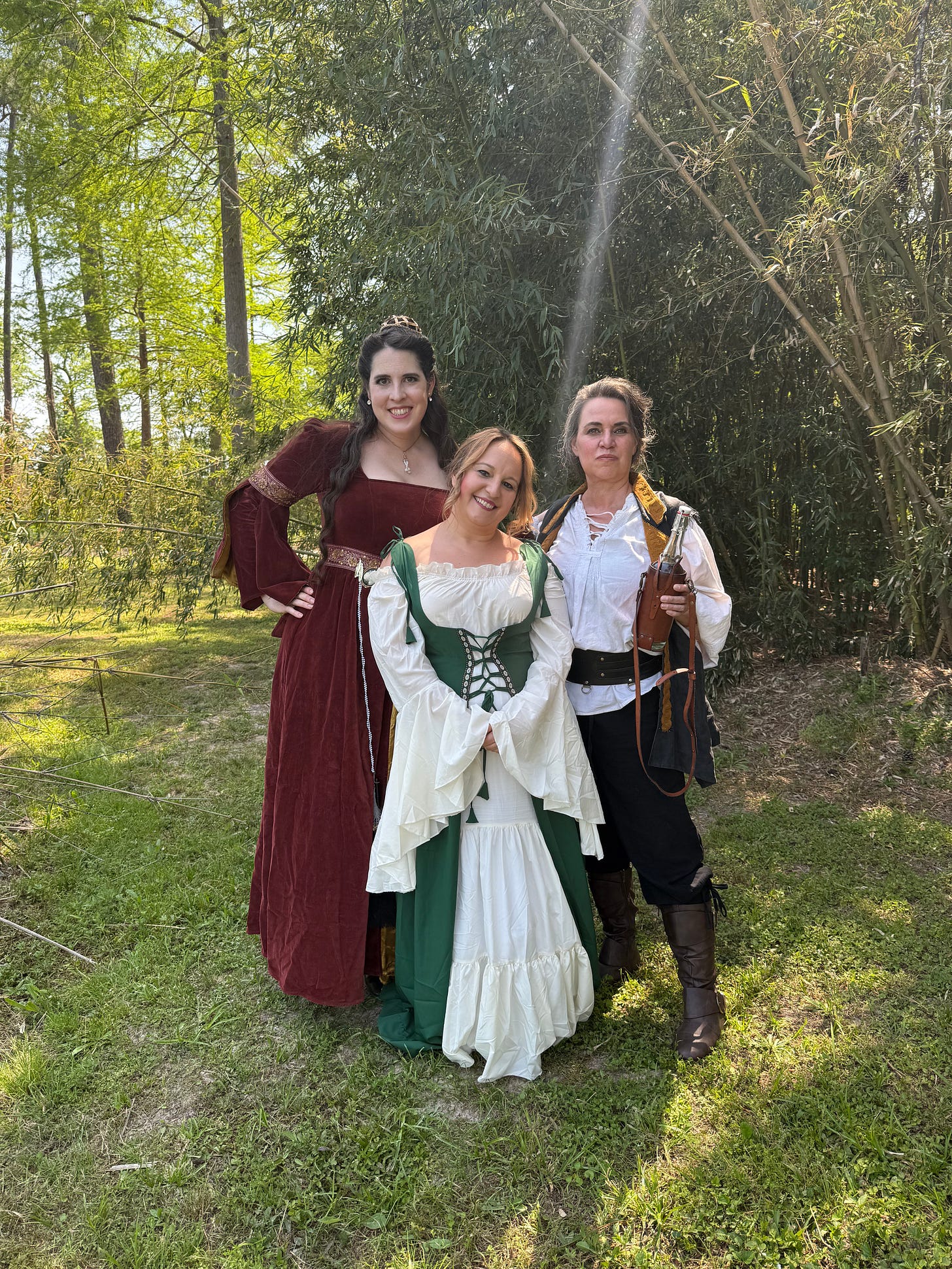
“[F]or besides that he’s a fool, he’s a great quarreler: and but that he hath the gift of a coward to allay the gust he hath in quarreling, ‘tis thought among the prudent, he would quickly have the gift of a grave.” — Twelfth Night, Act I, Scene 3.
We’ve all met this guy, right? Seen him starting stuff at a bar over a sports rivalry (trust me, I’ve lived in Philly) or interceded as he’s bullied a barista over misspelling his name on his coffee cup. A few of us have even worked for him. My sympathies.
One of the things that allows Shakespeare’s works to endure is his ability to succinctly introduce a timeless character. A character who, the moment they open their mouths, you think, “ah yeah, that’s Jimmy from my yoga class.” Personally, I like to think Shakespeare spent a lot of time in pubs overhearing conversations and really observing the people around him, and that is why he so expertly crafts a character. But you’re free to have your own theories.
The Shake-Scene
Anyway, back to this guy. A guy who loves to pick a fight, but will turn tail and run the second he’s challenged. In Shakespeare’s Twelfth Night, that guy is Sir Andrew Aguecheek.
Sir Andrew is flamboyant and excitable. He has an overinflated sense of his abilities and, according to himself at least, dances a mean jig. He’s tricked into entering our story by Sir Toby Belch (think a proto-Bart Simpson). Sir Toby convinces Sir Andrew to woo the Lady Olivia. We all know Sir Andrew doesn’t have a snowball’s chance at succeeding — Olivia is a bit high on her own drama, melodramatically grieving and refusing all suitors (until she meets a girl dressed as a boy, but that’s a story for a different Substack).1 Sir Toby just wants Andrew to stick around and buy the beer, and Sir Andrew lacks the interiority to understand the ruse.
The quote above, uttered before Sir Andrew even takes the stage, tells us exactly who he is. Not only does he not have the sense God gave a goose, but he loves to pick a fight. Thankfully, he’s too much of a coward to follow through on that fight. But this propensity toward both fight and flight is exactly who brings the play to its comic conclusion.
Poor Sir Andrew is tricked by Sir Toby (and others) into challenging Cesario to a duel, because Lady Olivia chose Cesario over Sir Andrew. Unbeknownst to Sir Andrew, and Olivia, Cesario is actually a shipwrecked woman named Viola who has dressed as a boy to find work for a local Duke. And unbeknownst to nearly everyone, Viola’s identical twin brother Sebastian was also shipwrecked somewhere else and has now found his way to this little town. If this is sounding like an Amanda Bynes movie, you aren’t wrong. But more on that later.
Sir Andrew challenges Cesario who is just as terrified of the prospect of the duel as he is (Viola is a proper lady and not at all adept at brawling). Their attempt at a duel is more hilarious than frightening, with each trying to avoid it at all cost. Eventually, the pirate who saved Sebastian stops the duel, mistaking Viola for her brother. That’s how Viola learns her brother might still be alive.
As for Andrew, his lack of sense prevails. He later runs into who he believes to be Viola, and once again issues the challenge. But it isn’t Viola. It’s Sebastian. Sebastian is well on his way to beating the snot out of Sir Andrew and potentially Sir Toby (depending on how much competence you want to give old Bart), when Olivia breaks in to save Sebastian believing him to be Viola/Cesario.2 Olivia demands that Sebastian marry her, and, himbo that he is, Sebastian agrees.
Eventually, Viola and Sebastian are reunited (and the mistaken identities unraveled) when Sir Andrew barges into Act V accusing Cesario/Viola of giving him a “bloody coxcomb” (i.e. likening a broken head to the red plume atop a rooster’s head). Shortly thereafter, Sebastian enters to apologize to the Lady Olivia for his assault on Sir Andrew (and Sir Toby), and everyone realizes their mistakes.
So, the next time you come across someone who is more bark than bite, take solace in knowing that, perhaps, they will be the impetus for your own comedic ending.
Speak the Speech, I Pray You
Bring Shakespeare’s words into your own life by:
Fussing at that dummy in traffic who feels the need to honk even when the light is red;
Provide commentary to the advertisements for your local plaintiff’s attorney; and
Apologizing for your dog who really is more bark than bite:
My Twelfth Night
As an aside (the term used when a character speaks directly to the audience), I was in a production of Twelfth Night earlier this month. I played the delightful and mischievous Maria who sadly didn’t make an appearance in this post above, so I’m including some photos below. See if you can spot the Andrew Aguecheek in our production.
Also, this Substack may not be the most consistent, but I’m darn cute ☺️.
Oh, and of course:
We don’t actually know the day he was born (we estimate based on church records of when he was christened), but we observe the date as April 23rd 💖.
All the best!
-LL
Namely the previous Substack I did on Twelfth Night, “Bear-Naked Shakespeare,” on June 5, 2023.
Note, this mirroring lends credence to the idea that the pirate is as in love with Sebastian as Olivia is with Viola/Cesario, but that is also a discussion for another day.






As always, a great read!